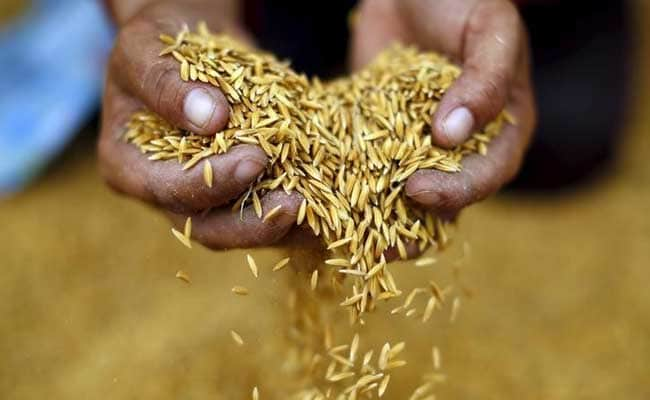
If humans consume an excessive amount of nitrate of their diets, it is able to intrude with the capacityof red blood cells to transport oxygen in the frame, the file said. (Reuters photo)
NAIROBI, KENYA: As they battle to deal with greater intense climate, a variety of meals crops areproducing more of chemical substances which could purpose health troubles for human beings andlivestock who eat them, scientists have warned.
a brand new document by using the United international locations surroundings Programme (UNEP) says that plants consisting of wheat and maize are producing extra capacity pollution as a reaction toshield themselves from severe climate.
however these chemical compounds are harmful to humans and animals if fed on for a prolonged time frame, in step with a file launched all through a United countries environment meeting meeting in Nairobi.
“vegetation are responding to drought conditions and increases in temperature much like people do whenfaced with a annoying situation,” defined Jacqueline McGlade, leader scientist and director of thedepartment of Early warning and assessment at UNEP.
under ordinary conditions, as an example, flowers convert nitrates they soak up into nutritious amino acids and proteins. but extended drought slows or prevents this conversion, main to more potentiallyelaborate nitrate gathering in the plant, the record stated.
If humans eat an excessive amount of nitrate of their diets, it may intrude with the capacity of crimsonblood cells to transport oxygen within the body, the record stated.
crops vulnerable to gathering an excessive amount of nitrate in instances of pressure include maize, wheat, barley, soybeans, millet and sorghum, it said.
DROUGHT, THEN RAIN
some drought-confused vegetation, while then uncovered to unexpected large quantities of rain thatcause rapid increase, in flip gather hydrogen cyanide, more commonly referred to as prussic acid, therecord stated.
Prussic acid – one of the components used in some sorts of chemical war – interferes with oxygen waft inhumans. Even short–time period publicity may be debilitating for people, McGlade said.
vegetation consisting of cassava, flax, maize and sorghum are maximum liable to dangerous prussic acid accumulation, the report stated.
instances of nitrate or hydrogen cyanide poisoning in human beings were said in Kenya in 2013 and in thePhilippines in 2005, McGlade stated. In Kenya, two children died in coastal Kilifi after consuming cassava that had raised levels of prussic acid in it following intense rainfall, consistent with nearby media reviews.
Aflatoxins, molds that may affect plant crops and raise the danger of liver harm, most cancers and blindness, as well as stunting foetuses and toddlers, are also spreading to greater areas due to shiftingweather styles as a result of climate change, scientists said.
McGlade said about 4.5 billion humans in growing countries are exposed to aflatoxins every 12 months,although the amounts are in large part unmonitored, and the numbers are growing.
“we are just beginning to comprehend the value of toxin- related problems confronting farmers ingrowing countries of the tropics and sub-tropics,” the document stated.
“As warmer weather zones increase towards the poles, nations in greater temperate areas are facing new threats,” it added.
In 2004, Kenya suffered severe outbreaks of aflatoxin poisoning, which affected greater than 300 human beings and killed extra than a hundred following a prolonged drought, in step with the global livestockstudies Institute.
EUROPE AT chance
The UNEP document stated Europe could be at developing danger from aflatoxins in regionally growncrops if global temperatures rise via as a minimum 2 ranges Celsius. the arena is currently on a route to a greater than three diploma Celsius temperature upward thrust, scientists agree with.
An increase in toxic compounds in crops is probable to impact heavily on the world‘s health gadget, that are already suffering with the effects of food lack of confidence, Dorota Jarosinska of the sector fitnessorganization‘s eu middle for surroundings and health said in an interview with the Thomson Reutersfoundation.
Alex Ezeh, executive director of the African populace health and research middle, said the increase intoxins in vegetation was a big situation.
“toxic plants can result in neurological diseases among humans but the finest task is the prevalence ofmost cancers,” he said in an interview.
The report proposes a list of 8 ideas farmers and agricultural specialists can adopt to try to restrictiondamage from extra crop toxins, which include mapping contamination hotspots and building betterproof about what’s occurring now with the pollution of their vicinity.
Scientists also advise that growing crop varieties designed to deal with extreme climate should assistlessen the ranges of poisonous chemical compounds in food.
“studies facilities with the Consultative institution on global Agricultural research are growing seedswhich might be suitable in diverse areas that have been hit by means of climate exchange,” McGladestated.
